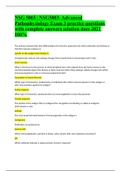Nsg5003 path - Study guides, Class notes & Summaries
Looking for the best study guides, study notes and summaries about Nsg5003 path? On this page you'll find 41 study documents about Nsg5003 path.
Page 3 out of 41 results
Sort by

-
NSG 5003 PATHOPHYSIOLOGY FINAL STUDY GUIDE / NSG5003 PATHOPHYSIOLOGY FINAL STUDY GUIDE: GRADED A | 100% CORRECT |SOUTH UNIVERSITY
- Other • 102 pages • 2021
-
- $22.99
- + learn more
NSG 5003 PATHOPHYSIOLOGY FINAL STUDY GUIDE / NSG5003 PATHOPHYSIOLOGY FINAL STUDY GUIDE: GRADED A | 100% CORRECT |SOUTH UNIVERSITY
NSG 5003 Pathophysiology Quiz 2 / NSG5003 Pathophysiology Quiz 2: GRADED A | 100% CORRECT |SOUTH UNIVERSITY
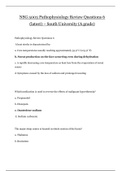
-
NSG 5003 / NSG5003 Pathophysiology Review Questions 6 (latest) – South University (A grade)
- Exam (elaborations) • 4 pages • 2021
-
- $11.39
- + learn more
NSG 5003 Pathophysiology Review Questions 6 (latest) – South University (A grade) Pathophysiology Review Questions 6 A heat stroke is characterized by: a. Core temperatures usually reaching approximately 39.9° C (103.9° F) b. Sweat production on the face occurring even during dehydration c. A rapidly decreasing core temperature as heat loss from the evaporation of sweat ceases d. Symptoms caused by the loss of sodium and prolonged sweating Which medication is used to reverse th...
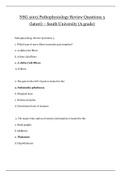
-
NSG 5003 / NSG5003 Pathophysiology Review Questions 5 (latest) – South University (A grade)
- Exam (elaborations) • 4 pages • 2021
-
- $10.99
- + learn more
NSG 5003 Pathophysiology Review Questions 5 (latest) – South University (A grade) Pathophysiology Review Questions 5 1. Which type of nerve fibers transmits pain impulses? a. A-alpha (Aa) fibers b. A-beta (Ab) fibers c. A-delta (Ad) fibers d. B fibers 2. The gate in the GCT of pain is located in the: a. Substantia gelatinosa b. Marginal layer c. Nucleus proprius d. Dorsolateral tract of Lissauer 3. The major relay station of sensory information is located in the: a. Bas...
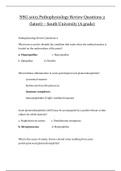
-
NSG 5003 Pathophysiology Review Questions 2 (latest)/ NSG5003 Pathophysiology Review – South University (A grade)
- Exam (elaborations) • 4 pages • 2021
-
- $9.49
- + learn more
NSG 5003 Pathophysiology Review Questions 2 (latest) – South University (A grade) Pathophysiology Review Questions 2 What term is used to identify the condition that exists when the urethral meatus is located on the undersurface of the penis? a. Hypospadias c. Hyperspadias b. Epispadias d. Chordee
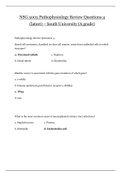
-
NSG 5003 / NSG5003 Pathophysiology Review Questions 4 (latest) – South University (A grade)( 100% Correct)
- Exam (elaborations) • 4 pages • 2021
-
- $7.49
- + learn more
NSG 5003 Pathophysiology Review Questions 4 (latest) – South University (A grade) Pathophysiology Review Questions 4 Renal cell carcinoma, classified as clear cell tumors, arises from epithelial cells in which structure? a. Proximal tubule c. Nephron b. Distal tubule d. Glomerulus
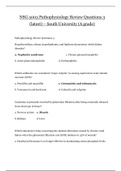
-
NSG 5003 / NSG5003 Pathophysiology Review Questions 3 (latest) – South University (A grade)
- Exam (elaborations) • 3 pages • 2021
-
- $7.49
- + learn more
NSG 5003 Pathophysiology Review Questions 3 (latest) – South University (A grade) Pathophysiology Review Questions 3 Hypothyroidism, edema, hyperlipidemia, and lipiduria characterize which kidney disorder? a. Nephrotic syndrome c. Chronic glomerulonephritis b. Acute glomerulonephritis d. Pyelonephritis Which antibiotics are considered “major culprits” in causing nephrotoxic acute tubular necrosis (ATN)? a. Penicillin and ampicillin c. Gentamicin and tobramycin b. Vancomyc...
NSG 5003 | NSG5003- Advanced Pathophysiology Exam 3 practice questions with complete answers solution docs 2021 100%
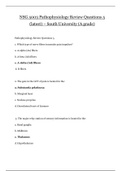
-
NSG 5003 Pathophysiology Review Questions 5 (latest) – South University (A grade) | NSG5003 Pathophysiology Review Questions 5 (latest)
- Exam (elaborations) • 4 pages • 2021
- Available in package deal
-
- $6.99
- + learn more
NSG 5003 Pathophysiology Review Questions 5 (latest) – South University (A grade) Pathophysiology Review Questions 5 1. Which type of nerve fibers transmits pain impulses? a. A-alpha (Aa) fibers b. A-beta (Ab) fibers c. A-delta (Ad) fibers d. B fibers 2. The gate in the GCT of pain is located in the: a. Substantia gelatinosa b. Marginal layer c. Nucleus proprius d. Dorsolateral tract of Lissauer 3. The major relay station of sensory information is located in the: a. Bas...

How much did you already spend on Stuvia? Imagine there are plenty more of you out there paying for study notes, but this time YOU are the seller. Ka-ching! Discover all about earning on Stuvia




